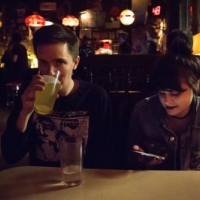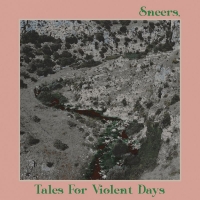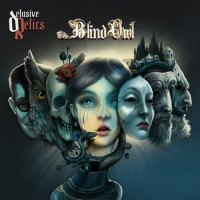Cherry Red Records released Silhouettes & Statues: A Gothic Revolution – 1978 – 1986 on June 30th, an ambitious and comprehensive 5 disc box set that covers an essential musical era that was a direct response to social, political, and economic dystopia of the United Kingdom in the ‘70s and ‘80s. Silhouettes & Statues provides a comprehensive view of the bands, large and small, that captured the spirit of gothic music. Steve Spon of the renowned band UK Decay has graciously answered some questions about his place in the gothic music realm and what he’s currently up to.
Hello Steve! It is a distinct honor for me to reach out to you and ask you all about your influential music and involvement with the Silhouette & Statues compilation album, which covers the revolutionary years of UK gothic music from 1978 to 1986. To begin, what does the term ‘gothic’ mean to you?
Thank you very much. Before the late ‘70s, the term ‘Gothic’ I understood to be the imagery associated around middle-aged cathedrals with gargoyles and flying buttresses, and Batman comics and ‘Paranormal’ story collections by authors such as Edgar Allen Poe and H P Lovecraft I used to read; basically anything with ‘Dark’ , ‘Horror’, or a sublime context. Abbo [Steve Abbot, frontman of UK Decay until 1983] read widely amongst German authors such as Herman Hess et al.; in fact, I think we all had an interest in such matters.
During the time period that this compilation draws from, were you known as a gothic band? If so, what did that mean to you at the time?
No, the terms ‘Goth’ or ‘Gothic Punk’ to describe the new brand of punk never really caught on until the year after we had split up. Abbo used to comment on our ‘gothic’ sound, particularly in early 1981 during the winter tour of Germany and Belgium where Steve Keaton joined us for an interview. At that time, we had played all day at the Music Machine in Berlin and it was one of the local punks birthday. So whilst we were rehearsing, Abbo and these guys headed for a fancy dress shop and returned wearing werewolf and Dr. Phibes costumes and such like. Abbo then continued to wear his latex Dr. Phibes mask along with his Macintosh for the remainder of the tour. A year later, Abbo was using the term ‘goths’ to describe Bauhaus and SGC fans that were hybridizing the punk and horror look.
In your opinion, what is the overarching importance of the gothic music genre?
I would say it was the drama, the sound, and the look of these bands and their fans. It was imho a direct manifestation of life under the dark and drab Thatcher years. Although we delved into darker subject matters, we also felt it was really important to reach for a more positive attitude in our message. To show that there was a stronger and more profound context to writing in the post-punk era than the “Oi Oi” or straight anarchistic hardcore punk that was being championed by the likes of Gary Bushell, etc…
How has gothic music/culture impacted your life? How has the passage of time, with its accumulation of experiences, shaped your outlook?
I like to create the kind of music I like to hear; that is rule one. Usually that means chord structures and moods that are often minor-based or discordant. So-called ‘pop’ music to earn big bucks was never my thing, although as a producer and recording engineer I have attempted to help others along this path at times. The music I tend to like by default is generally ‘dark’, as is the written word, artwork, and movies that I enjoy best. Like punk beforehand, ‘goth’ is an attitude that in itself transcends attire and make-up. I have journeyed through other styles and flavours, but my earlier fondness for darker atmospheres pervades still in my music today.
What were some of the main themes that you addressed on your records?
Sex, death, the old gods, the new gods, war, human frailty, politics, deceit, horror, fear, etc… Having a sense of humour and a positive attitude to prepare oneselves for the above.
Why did you choose to include “Black Cat” on this compilation?
“Black Cat” was an early and important UK Decay song that was instrumental in setting the band’s ‘darker’ post-punk course. It was written at a time when most of us were high on magic mushrooms. There is a little clue to this on the back cover of the EP jacket. The song was a live favourite through both the early and later periods of the band’s career. I re-mastered “Black Cat” especially for the Statues and Silhouettes compilation.
Please recount a (crazy, good, bad) highlight from your music career.
Our first tour of the west coast of the US. Over a month there was a catalogue of mad and crazy events that occurred, including someone leaving a decapitated dog’s head outside of our dressing room in Portland! The whole concert in Seattle was placed under siege by a local gang of rednecks who surrounded the venue. We had to be escorted out by the police. Later, we attended a party and some of us set out to find the late Jimi Hendrix’s grave. I can’t remember anything after that except I had an email a few years ago from a lady who said she was the one who found some clothes for me after I had lost them! Hmm…
What bands/artists, goth or not, are you into at the moment?
Currently I have much wider tastes than I used to have, but I am always on the look-out for something new. I like to listen to some of the urban music currently in vogue. I have to say I do find some of it interesting, but I don’t like the over-vocalizing rap unless the lyrics are thoughtful. I listen at times to Scandinavian metal and European darkwave. I am not very good with names, but there is always something out there that turns my ear. I recently enjoyed a live set by RDF and enjoyed the Sleaford Mods and the Savages. I also like Finland’s Silent Scream and St. Petersberg’s Salome’s Dance.
Unofficial Audio of "Black Cat":
Official live video of “Unwind” at Rebellion 2009:




